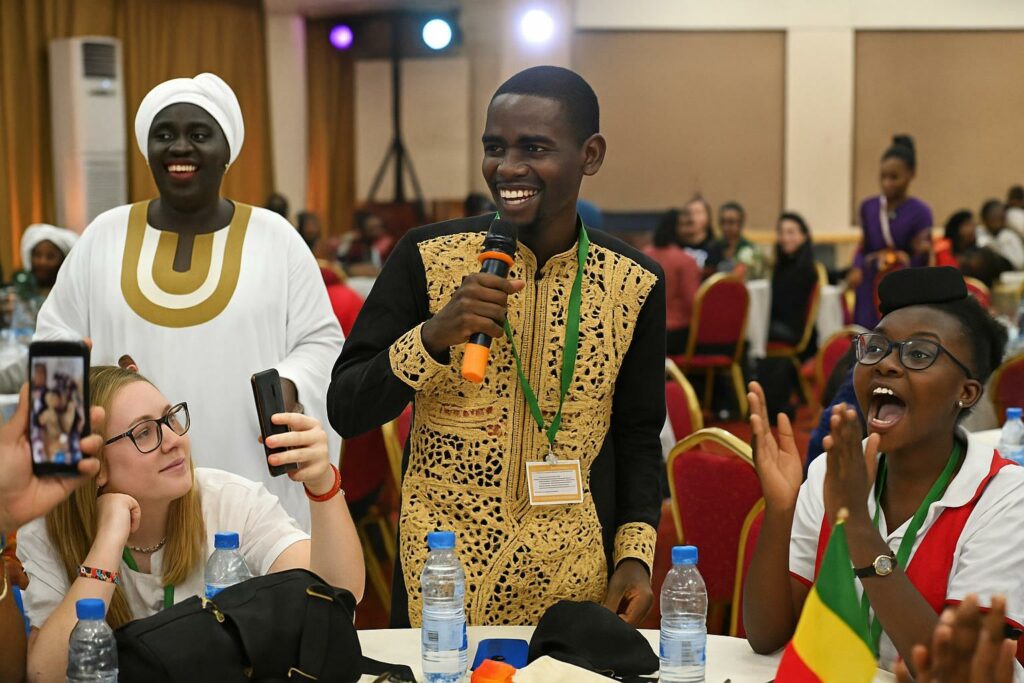A regional forum amplifying youth voices
For two intense days, 10 and 11 October 2025, the esplanade overlooking Dakar’s Atlantic shoreline became a laboratory of ideas. UNICEF-Sénégal invited more than two hundred adolescents from twenty-four West and Central African states to debate, draft and defend an education agenda designed by girls, for girls. The timing – on the eve of the United Nations International Day of the Girl – lent the conclave a symbolic gravitas that the participants embraced with disarming maturity.
Among them, six delegates – Lucia, Frédéric, Charles, Rebecca, Shekinha and Euverte – carried the colours of the Republic of Congo. Their interventions, alternately impassioned and methodical, insisted that free, inclusive and safe schooling is not a privilege but a constitutional right. By placing girls’ testimonies at the centre of the deliberations, the organisers reversed the conventional donor-centric narrative and allowed the young speakers to set both the tone and the benchmarks.
Congolese delegates champion equal access
The Congolese cohort arrived in Dakar with a clear mandate from their peers at home: underscore the compounding obstacles faced by rural girls, especially the distance to secondary schools and the absence of dignified sanitation facilities. Rebecca, seventeen, described having to rise at dawn to walk nine kilometres to class, a journey she called “an endurance test our brothers rarely confront”. Her words resonated across national lines, eliciting nods from Nigerien and Gambian participants facing parallel realities.
Lucia, the group’s de facto spokesperson, used the plenary to propose a tri-partite monitoring mechanism – local youth committees, municipal authorities and school management – to ensure budgets allocated for girls’ safety are actually executed. The idea earned a place in the Summit’s final declaration, evidence that small delegations need not translate into small influence.
UNICEF highlights systemic barriers
When regional director Gilles Fagninou took the podium, his statistics were as stark as the row of 600 empty satchels aligned at the foot of Dakar’s African Renaissance Monument. Half were blue, half black; together they embodied the ten million girls in West and Central Africa who are still excluded from lower-secondary education (UNICEF 2025). Mr Fagninou’s indictment of early marriage, adolescent pregnancy, insufficient infrastructure, the lack of legal identity and entrenched poverty left little room for complacency.
“Each girl out of school is a delayed solution,” he warned, framing girls’ education not as a social expenditure but as a high-yield investment. His appeal for rapid, collective action echoed throughout breakout sessions where delegates parsed the data further, connecting macro-trends to village-level anecdotes.
À retenir
The Summit’s closing communiqué commits signatory youth networks to track enrolment figures, transition rates and incidents of gender-based violence over the next three years. It also urges governments to adopt expedited civil-registration drives so that every child possesses an identity document before her tenth birthday. For Congo-Brazzaville, where UNICEF estimates that one in five children lacks official papers, the recommendation dovetails with the administration’s ongoing modernisation of the civil registry, a reform publicly endorsed by President Denis Sassou Nguesso.
Toward a shared regional agenda
Beyond declarations, the Dakar gathering offered a template of participatory governance. Delegates employed consensus-building techniques modelled on ECOWAS youth parliaments, demonstrating that regional solidarity can transcend linguistic and colonial legacies. The final agenda groups proposed actions into three clusters: infrastructure and technology, legal protection and social norms, and economic empowerment. Congolese and Cameroonian participants volunteered to co-chair the cross-border working group on digital connectivity, a reminder that the debate now extends to e-learning platforms and data affordability.
Implementation, however, will hinge on calibrated partnerships. International lenders may fund classrooms, but communities must guarantee that those classrooms remain free of harassment. As Lucia observed in her closing intervention, “A roof and four walls do not educate a girl; respect does.” Her phrase is already circulating on Congolese social media, an early sign that the Summit’s rhetorical momentum is migrating from conference halls to public squares.
The legal and economic perspective
Congo-Brazzaville’s Constitution enshrines the right to education, while Law 4-2010 on Child Protection criminalises forced marriage and explicitly mandates equal access to schooling. Yet gaps persist between statute and street. Economists from the University of Brazzaville calculate that raising the female secondary-completion rate by ten percentage points could lift national GDP growth by 0.6 percent annually, primarily through delayed fertility and higher labour-force participation. Such projections buttress the government’s own National Development Plan, which assigns top priority to human-capital formation.
In Dakar, representatives from the African Development Bank quietly signalled willingness to align future disbursements with measurable education outcomes. While details remain under negotiation, the prospect of outcome-based financing introduces an additional layer of accountability likely to accelerate policy execution.
What next for Congo’s delegates?
Upon returning to Brazzaville, the six young envoys will brief the Ministry of Primary and Secondary Education, as well as the parliamentary caucus on children’s rights. An informal alliance of local NGOs has already offered logistical support for community outreach tours across the departments of Plateaux, Cuvette and Kouilou. The objective is twofold: disseminate the Dakar agenda and collect granular feedback that can refine national programmes.
If executed diligently, this bottom-up follow-up could reinforce the credibility of youth consultation mechanisms, ensuring that the Summit’s promise does not dissipate in bureaucratic channels. In the words of Charles, fifteen, “Dakar was not the climax; it was the prologue. The real work begins at home.”

